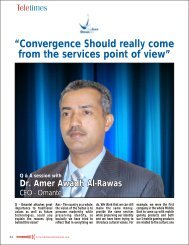Teletimes April 2011.pdf
Teletimes April 2011.pdf
Teletimes April 2011.pdf
Create successful ePaper yourself
Turn your PDF publications into a flip-book with our unique Google optimized e-Paper software.
years. Today, worldwide Internet<br />
users are over 600 million users<br />
in Asia, 130 million in Latin<br />
America and the Caribbean, and<br />
50 million in Africa.(Source ITU:<br />
ICT Indicators database2008).<br />
The following graphs depicts<br />
the global Internet subscription<br />
growth in terms of various<br />
modes of Internet provisioning<br />
from 2003-2009. The comparison<br />
is presented separately<br />
for developed and developing<br />
countries. The comparison depicts<br />
that if the mobile internet<br />
subscriptions are on the rise in<br />
developed world then for developing<br />
countries fixed internet<br />
subscriptions are periodically on<br />
the rise too.<br />
Definition of “Child”<br />
Various nations have defined<br />
“child”, However most of the<br />
countries have defined it as<br />
someone below the age of 18. In<br />
Pakistan various definitions of<br />
child exist:<br />
1. According to the Article. 11.<br />
The Constitution of Islamic<br />
Republic of Pakistan, 1973.- S.<br />
3 (1). Definitions.- The Punjab<br />
Destitute and Neglected Children<br />
Act, 2004 (Pb. Act XVIII<br />
of 2004), child is defined as<br />
(e)“child” means a natural<br />
person who has not attained the<br />
age of eighteen years.<br />
2. Also in The Pakistan Penal<br />
Code, 1860 (Act XLV of 1860)<br />
S. 299. Definitions.-<br />
(a) “adult” means a person who<br />
has attained the age of eighteen<br />
years;<br />
(i) “minor” means a person who<br />
is not an adult.<br />
3. Convention 182 of the International<br />
Labour Convention on’<br />
Elimination of the Worst Forms<br />
of Child Labour’ defines a child<br />
as “anyone under the age of 18”.<br />
4. Also The United Nations ‘Optional<br />
Protocol to the Convention<br />
on the Rights of the Child<br />
defines a child as anyone under<br />
the age of 18 unless majority is<br />
attained at an earlier age under<br />
the applicable law.<br />
The definition of a child referred<br />
here within this document is “a<br />
person who is below 18 years of<br />
age”. However it must be kept in<br />
mind that age, grade and gender<br />
of a child also matters as for<br />
instance children with premature<br />
mind sets may often be visiting<br />
the political websites and<br />
activists might be using them<br />
for radical activities in a country.<br />
The same is a very intense issue<br />
as far as Pakistan is concerned.<br />
Similarly according to various<br />
studies both genders exhibit different<br />
patterns of website visits.<br />
Emerging problems<br />
Since internet has no boundaries<br />
so the issue has to be solved<br />
globally. Nevertheless there are<br />
certain problems that relate to<br />
or within the boundaries of a<br />
specific country. It is the responsibility<br />
of every country to flag<br />
such issues so that they could be<br />
dealt in a fair way. For instance<br />
in a developed world a child<br />
may be naïve enough to land<br />
in a website or content which<br />
is not permitted for a child of<br />
his age, and invariably he might<br />
develop a wrong understanding<br />
of things and harm himself. On<br />
the other hand in a developing<br />
country like Pakistan an<br />
immature mind might land into<br />
a website which exhibits racism<br />
and religious discord. These sites<br />
inflict hatred and extremism<br />
which ultimately have daring<br />
consequences on not only that<br />
kid but he might end up in a<br />
suicide attack, thereby harming<br />
himself and hundreds of others.<br />
So this is a different yet imperative<br />
dimension of protecting<br />
young children online.<br />
In this day and age when<br />
children have access to camera<br />
phones, wireless hot spots and<br />
easy-to-hide computer chips<br />
that can store vast collections of<br />
content, they are more vulnerable<br />
to risks, since any and every<br />
kind of information is available<br />
for them and that too all<br />
the times. Children in the age<br />
bracket of 6-14 years are most<br />
vulnerable to risks, one of the<br />
reasons for this is the loss of<br />
the parental control. Parental<br />
control is difficult to emphasize<br />
because in most of the situations,<br />
since in most of the cases<br />
both of the parents are working<br />
and it is kind of difficult for<br />
them to monitor the activities<br />
of their kids. On the other hand<br />
in a developing world there is a<br />
vast majority of parents who are<br />
not educated at all, and mostly<br />
it’s their first generation who is<br />
attending schools or have access<br />
to any sort of online information.<br />
In such cases the parents/<br />
guardians are naive enough to<br />
know what sorts of information<br />
their kid is exposed to? What<br />
could be the potential harms<br />
that this information could<br />
inflict? The kid might be in a<br />
regular contact with a person<br />
or group online, who could very<br />
easily brain wash an immature<br />
mind and the result could be<br />
devastating at the end. Also it<br />
is a very common practice these<br />
days to seek advice online, since<br />
kids would like to share and get<br />
opinions about things which<br />
they might not as otherwise be<br />
comfortable talking with their<br />
parents. So it is very essential<br />
that the content should be<br />
monitored that could potentially<br />
harm minors, and not only<br />
parents but teachers should also<br />
play an active role for identifying<br />
issues and problems that<br />
could threat children.<br />
Importance of Parenting<br />
Parents who are fairly firm and<br />
consistent in their expectations<br />
of how their children should be-<br />
10 www.teletimesinternational.com<br />
15Apr - 14May 2011

















